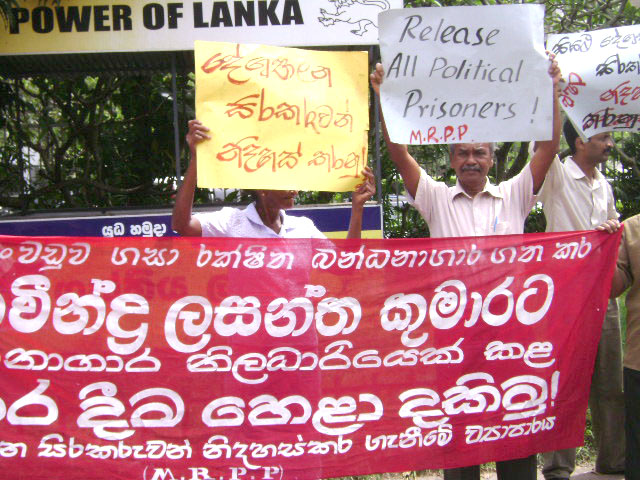
THE Sri Lankan military intelligence unit took into custody twenty five young men in the country’s western province, (Colombo, Gampaha) on February 5 2005 – twenty of them are Sinhala youths, others are from the plantation areas.
They were all branded as pro-LTTE supporters in the south.
They were trade union leaders, journalists, a University lecturer and a student.
Next they were handed over for ‘terrorist investigation’ and then sent to jail.
Every fourteen days, they have been produced in front of the chief magistrate at Colombo high court.
On November 23, 2007, the prisoner Ravindra Lasantha Kumara was beaten by the prison guards when they returned him to jail after appearing in high court.
As a result of the beating his nose and left ear were wounded and bleeding.
The just formed Movement To Free the Political Prisoners has complained about inhuman activities by the state to the Human Rights commission locally and internationally.
On 7 December 2007 this situation was brought to the attention of the Chief Magistrate by legal officers when prisoners were produced to the court.
The Movement to Free Political Prisoners organised a protest campaign against the beatings of political prisoners, and picketed the High Court on December 7 2007 at 1pm, supported by family members of the political prisoners and trade unionists and members of workers parties.
We are appealing to the international community and human rights activists to please organise a campaign to release Sri Lankan political prisoners, of whom there are now over 12,000.
The government and right wing forces are seeking to brand the political prisoners as terrorists, trying to use US President Bush’s propaganda that somehow they are part of the ‘war against terror’ and not trade union leaders and progressive people.
Meanwhile as TamilNet has reported, Colombo’s anti-terror laws are being used to assist killings, abductions and torture.
Minority Rights Groups International (MRG), an accredited non governmental organisation with the United Nations, in a report released on Thursday said that, after the promulgation of broad anti-terror laws in December 2006, Sri Lanka ‘has not hesitated to use these laws, and the country’s human rights situation deteriorated.
‘Under a general climate of impunity, 2007 has largely been marked by intense warfare, mass displacement, killings, abductions and torture in Sri Lanka.
‘Counter-terrorism laws are used to arrest and detain hundreds of Tamils, to cordon, search and harass minorities, and to create High Security Zones (HSZs) claiming vast areas of minority lands, thereby affecting livelihoods,’ the report said, giving credence to appeals by Muslims and Tamils that traditional lands, where their ancestors have lived for generations in the east, are being appropriated by Colombo under the rubric of HSZs.
The report said that the government’s continuing violations of human rights in the guise of the ‘war on terror’ deserves serious attention, despite the presence of several other types of violations.
The report quoted the UNHCR (United High Commission for Refugees) statement that nearly four months later, in November 2007, forcible return is continuing in the east with local authorities threatening to withdraw their assistance if people do not go back to their homes.
‘But the human rights abuses do not end with forced return. They continue, deeply woven into the everyday lives of minority Tamils and Muslims in the east – carried out by government security forces in the name of fighting terrorism.
‘Returnees are put through intense security measures and face routine checks by the Sri Lankan military.
‘Large chunks of minority owned land have been blocked out as High Security Zones (HSZs) by the government.
‘In Sampur, close to the north-eastern port city Trincomalee, the military has taken over a 35 square mile area of land, covering 15 villages, barring 15,000, mostly Tamil civilians, from their homes,’ the report said.
On the freedom of press, it stated: ‘Counter-terrorism laws have also been used to threaten media organisations.
‘In April 2007, alleging links with the Tigers, the government froze the assets of Standard Newspapers Private Limited, a newspaper company that runs a Sinhala and English weekly publication,’ the report added.
Meanwhile the Colombo based media watchdog, the Free Media Movement (FMM), on Sunday said it was disturbed to learn that officers of the Criminal Investigation Division (CID) had entered the house of senior Reuters photojournalist Anuruddha Lokuhapuarachchi at Sarojinee Watta, Ratmalana at 11am on 11th December and questioned his wife at length about his activities in the manner that they would interrogate a suspect of a serious crime.
The episode was aimed at instiling fear and anxiety in the mind of not just Mr Lokuhapuarachchi but all journalists who investigate and report on the conflict in Sri Lanka, the FMM said.